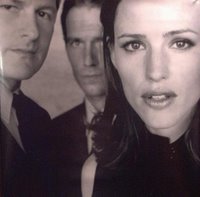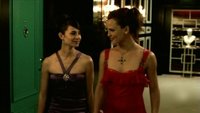Tuning Out: Why I Stopped Watching "Alias"
 Let me start by saying that I was originally obsessed with Alias with a zeal that approached my current love of fellow J.J. Abrams series Lost. I loved that at the heart of this spy drama there was a story about a deeply dysfunctional family (distant dad, dead mother) all of whom happened to be in the deadly business of high stakes espionage. While there were crazy costumes, wacky wigs, and fierce fights each week, I kept coming back because I cared deeply for Sydney Bristow (Jennifer Garner) and her colorful cast of co-workers. But then something happened...
Let me start by saying that I was originally obsessed with Alias with a zeal that approached my current love of fellow J.J. Abrams series Lost. I loved that at the heart of this spy drama there was a story about a deeply dysfunctional family (distant dad, dead mother) all of whom happened to be in the deadly business of high stakes espionage. While there were crazy costumes, wacky wigs, and fierce fights each week, I kept coming back because I cared deeply for Sydney Bristow (Jennifer Garner) and her colorful cast of co-workers. But then something happened...Before we get to that, let's recap first. Alias launched in the fall of 2001, shortly after the events of 9/11 and around the same time that a similarly spy-themed show was launching over on competitor Fox (that would be 24, natch). I instantly found 24 to be too eerily realistic, too stressful in a world that had just seen a real life terrorist attack. Alias, on the other hand, had a certain gleeful campiness along with its risky rescue missions, near-fatal extractions, and daring double-crosses. It also had an overarching plot about a 14th century inventor named Milo Rambaldi that was like crack to most TV geeks' hearts... But again, I'm getting ahead of myself.
At its heart, Alias was about Sydney Bristow--graduate student by day, spy by night--who had the convenient cover story that she worked for a bank, or at least that's what her gullible friends Francie (Merrin Dungey) and Will (Bradley Cooper) believed. In fact, Sydney worked for a black ops division of the C.I.A. called SD-6. SD-6 was an organization headed up by the mysterious Arvin Sloane (Ron Rifkin), a friend of Sydney's father who had a certain obsessive predilection for collecting the artifacts left behind by the aforementioned Rambaldi. After Syd's boyfriend Danny (Edward Atterton) proposes to her, Syd tells him about her secret life... and he promptly ends up dead--murdered by SD-6. So, Syd learns that she wasn't working for the CIA at all, but rather a terrorist organization that claimed to be part of the CIA. And that her dad Jack Bristow (Victor Garber) also works for SD-6 and is aware of the subterfuge all too well: he's a double-agent for the CIA. Syd is forced to approach the real CIA and is assigned to a handler named Michael Vaughn (Michael Vartan), who convinces her to turn double-agent as well. Syd will continue to work for SD-6, sabotaging missions whenever possible and transmitting intelligence back to the real CIA via dead-drop. She can't even tell her trusted SD-6 partner Marcus Dixon (Carl Lumbly) what's going on, for fear of placing him in danger.
 It was fun but also confusing as hell. Audiences didn't quite know what to make of Sydney's predictament (she works for a bank which isn't really a bank but a terrorist organization called SD-6 that claims to be part of the CIA, but really isn't, but she really works for the CIA) and in Season Two of the series, producers tried to clean things up a bit. SD-6 was taken down by the CIA and Arvin Sloane fled into hiding. Sydney dropped out of graduate school and was now only employed by the CIA and was dedicated to finding and capturing Arvin Sloane. Oh, and did I mention that her long-dead mother (Lena Olin) was actually alive and was a former KGB spy named Irina Derevko... the same KGB spy that killed the father of her CIA handler and would-be lover Vaughn... and who shot Sydney at the end of the first season? Talk about family drama.
It was fun but also confusing as hell. Audiences didn't quite know what to make of Sydney's predictament (she works for a bank which isn't really a bank but a terrorist organization called SD-6 that claims to be part of the CIA, but really isn't, but she really works for the CIA) and in Season Two of the series, producers tried to clean things up a bit. SD-6 was taken down by the CIA and Arvin Sloane fled into hiding. Sydney dropped out of graduate school and was now only employed by the CIA and was dedicated to finding and capturing Arvin Sloane. Oh, and did I mention that her long-dead mother (Lena Olin) was actually alive and was a former KGB spy named Irina Derevko... the same KGB spy that killed the father of her CIA handler and would-be lover Vaughn... and who shot Sydney at the end of the first season? Talk about family drama.Alias' second season really mined the family dynamic between Sydney, Jack, and Irina, delving into what made Jack the cold, unfeeling professional he is today and piecing together Sydney's childhood and early training (i.e. Project Christmas). Olin's Irina is dangerous, cunning, and manipulative and the early part of the second season has a Silence of the Lambs aspect to it as Sydney visits her imprisoned mother from the opposite side of a plexiglass cell wall. The Rambaldi plot was also pushed forward as the CIA and Sloane go head-to-head (along with various other factions) for control of the artifacts. The effect is dizzying and each of the characters is pushed to new depths of emotion--usually of the rageful revenge kind (i.e., Dixon, Sloane, Jack, etc.).
Where the show started to go wrong was to eliminate any trace of Sydney's personal life outside the rarefied walls of the CIA. Reporter Will comes dangerously close to exposing Sydney's identity in an ongoing subplot, which culminates with Sydney having to fill Will in on all of her activities; Will is ultimately made an analyst at the CIA and soon leaves the show. Poor Francie meanwhile undergoes a far worse fate. Arguably Syd's BFF, Francie soon becomes dull and tiresome, blathering on and on about this restaurant she wants to open as Sydney basically ignores her for the better part of a season. And the audience too grows tired of Francie as well, until she's brutally murdered in her own restaurant by a woman... who looks just like her. Goodnight, Francie; hello Freplicate (ahem, Francie Replicate). The woman in question is a villainous agent who underwent a radical appearance alteration to take Francie's place in Sydney's life. And at the end of the second season, Sydney realizes that the woman she's been living with for the past few months isn't her old pal Francie (it has to do with some coffee ice cream), Francie II attacks Sydney and the two have the monster of all catfights, resulting in Sydney shooting the Freplicate (she's not dead because, well, she can't die) and Sydney passing out.
However, when Sydney wakes up, she's no longer in her apartment but rather on a street in Hong Kong. A year has passed that she can't remember and she was thought to have been dead. Vaughn is now married to government official Lauren Reed (Melissa George), a blonde seductress who is not all she seems (this is Alias after all), but rather a member of the Covenant, a terrorist organization comprised of followers of Rambaldi (aha!). As the Rambaldi plot builds to a head, Sloane discovers that he has a child--a girl named Nadia--that he had conceived many years earlier with Irina, which would make her Sydney's sister. She's a major key to unraveling the entire Rambaldi mystery and Sloane locates Nadia (Mía Maestro), drugs and tortures her, and gets her to reveal a Rambaldi equation that is somehow locked inside her mind. But Sydney manages to burst in, ends up killing Lauren (who was eventually revealed to be Convenant, much to Vaughn's dismay), but Sloane escapes and Nadia goes with him. Before Lauren dies, she tells Sydney the location of a certain safety deposit box, where Sydney uncovers some information that makes her question everything about her father.
And that's where everything seems to go completely bloody wrong for Alias. I liked the idea of Nadia rather than what the show's producers and writers attempted to do with her. In Season Four, they had Sydney track down Nadia and invite her to join a reconstituted black ops unit that they are calling APO (Authorized Personnel Only... ick, I hate that name). Located in a Los Angeles subway station, APO is comprised of many former members of SD-6 and the CIA: Agent Weiss (Greg Grunberg), Vaughn, tech expert Marshall (Kevin Weisman), Jack, and... Sloane?!?
Some mumbo jumbo is introduced about how the government now trusts Sloane, yadda, yadda, yadda, and they are all there to keep an eye on him. But the best part is that they all work for him! I can understand having to work WITH him, but to work FOR Sloane, after everything he's done (killing Syd's fiance, killing Dixon's wife, killing thousands of innocent people, basically), Syd and the others would accept orders from this sociopath? For me, the show lost any sense of reality at that point.
 Additionally, pushing Sydney and Nadia together felt incredibly forced; the two have no relationship whatsoever and then suddenly they're living together and it's all "sisters" this and sisters that and they're having long meaningful conversations about the men in their lives (Syd and Vaughn have finally gotten together at this point and the producers wrongfully--VERY wrongfully--shoved Nadia and Weiss together so that they're all a happy little foursome). Nadia's entire purpose on the show it seems is to repeatedly refer to Sloane as her "father" and put on ridiculous disguises alongside Sydney so that the ABC promo department could show them kicking ass together and use Rosemary Clooney's song "Sisters." Aw, isn't that... sickening?
Additionally, pushing Sydney and Nadia together felt incredibly forced; the two have no relationship whatsoever and then suddenly they're living together and it's all "sisters" this and sisters that and they're having long meaningful conversations about the men in their lives (Syd and Vaughn have finally gotten together at this point and the producers wrongfully--VERY wrongfully--shoved Nadia and Weiss together so that they're all a happy little foursome). Nadia's entire purpose on the show it seems is to repeatedly refer to Sloane as her "father" and put on ridiculous disguises alongside Sydney so that the ABC promo department could show them kicking ass together and use Rosemary Clooney's song "Sisters." Aw, isn't that... sickening?But the main problem with Season Four was the way that the producers (at the network's insistence, I am sure) stripped down the mythology and structure of Alias to make it more "accessible" to casual or new viewers. Gone was the complicated swirling plots of the previous seasons, the tense cliffhanger episode endings, the dynamic interpersonal relationships that made the show unique and compelling. Missions were often stand-alone adventures that were quickly resolved within 44 minutes and lacked the creative spark and daring inventiveness of the three previous seasons.
The characters too suffered greatly in this season. Vaughn and Sydney's relationship became boring and devoid of any real chemistry. Meanwhile, Jack was virtually castrated, reduced to making "transpo" arrangements for the missions and then was exposed to some chemical that resulted in him having bizarre hallucinations and flashbacks. That secret that Syd uncovered at the end of Season Three that seemed so tantalizingly juicy? Perhaps something about Project Christmas or something awful Jack had done to her as a child? It turned out to be a needlessly complicated rigmarole about Jack ordering a hit on Irina, who supposedly had put out a hit on Sydney (she didn't). And that bit about Jack actually killing Irina? Turns out he didn't do that either; he killed someone who looked like Irina, while the real Irina was stuck in a spider hole in the jungle, where she is finally rescued by her daughters in order to save the world.
Oh, and that apocalypse? Seems it was brought about by a man I liked to call faux Sloane (Joel Grey), a Sloane lookalike, who had a cunning plan to use honey bees, an orchid, the water supply, and a large Rambaldi device that looked like a giant basketball in the sky that turned ordinary humans into zombie-like creatures. After four years of twists and turns and theories about Rambaldi and his master plan, that's the big endgame that this show has been leading up to? Zombies? You've got to be kidding me. Sadly, they weren't and my interest had faded about 22 episodes ago already.
Part of the problem may have had something to do with the fact that creator J.J. Abrams departed Alias to oversee his new show, a little drama about some survivors of Oceanic Flight 815. Something called Lost. Perhaps you've heard of it? Just as his departure crippled WB college drama Felicity, so too did his leaving Alias. And once Abrams did leave, he seemed to take with him the very essence of what made Alias interesting: that special blend of high-octane action, relationship drama, and sci-fi geekery. What we were left with was a run-of-the-mill spy drama that bore very little resemblance to the show we first saw way back in the fall of 2001.
Alias returns to ABC tonight with the final batch of episodes before it heads off to that program graveyard in the sky (and endless reruns in syndication, naturally). However, I'm not too sure that I can be along for the ride. After the disaster that was the fourth season, I stopped watching what had been my favorite drama on television cold-turkey. No peaking, no reading about it online, nothing. To me, the show died that moment Sydney walked into APO and began taking orders from the man who killed her beloved Danny. For me, that moment--more than Nadia, faux Sloane, or even zombies--killed my beloved show.
What's On Tonight
8 pm: The Amazing Race (CBS); Celebrity Cooking Showdown (NBC); One Tree Hill (WB); Alias (ABC; 8-10 pm); Bones (FOX); America's Next Top Model (UPN)
9 pm: Criminal Minds (CBS); Heist (NBC); The Bedford Diaries (WB); American Idol/Unan1mous (FOX); Veronica Mars (UPN)
10 pm: CSI: New York (CBS); Law & Order (NBC); Invasion (ABC)
What I'll Be Watching
8 pm: The Amazing Race.
On a new episode of The Amazing Race ("Here Comes the Bedouin!"), the teams travel to Oman, where they have to deal with some stubborn camels and it looks like the hippies are having a nervous breakdown of some kind. I can't believe that Barry and Fran remain in the race... but then again I am still mourning the loss of geeks Dave and Lori. (What other AR team ever had their very own theme music?)
8 pm: Alias.
I know, I know, I said I wouldn't watch this show anymore, but, well, there's no Lost on tonight (or next week unfortunately), so I might TiVo the two-hour "return" of Alias tonight (there's some sick part of me that just has to see how Alias implodes). Whether I can stomach it or not is up for debate in my household. On tonight's two-hour episode ("S.O.S."/"Maternal Instinct"), Jack enlists Weiss (guest star Greg Grunberg) and APO (ugh, I hate that name) to search for Sydney after receiving a distress call. Meanwhile, in the second hour, Jack and Syd are forced to work together with the deadly Irina Derevko (that would be the former Mrs. Bristow), but question her loyalties.


